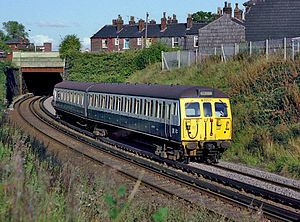British Rail Class 504
| British Rail Class 504 | |
|---|---|

A southbound Class 504 at Bury in British Railways blue and grey livery in 1982.
|
|
| In service | 1959–1991 |
| Manufacturer | BR |
| Order no. |
|
| Built at | Wolverton Works |
| Family name | 1959 EMU |
| Replaced | LYR electric units |
| Entered service | 1959 |
| Number built | 26 sets |
| Number preserved | 1 set |
| Number scrapped | 25 sets |
| Formation | 2 cars per trainset DMBS+DTS |
| Diagram |
|
| Fleet numbers |
|
| Capacity |
|
| Operator(s) | British Rail |
| Depot(s) | Bury |
| Line(s) served | Bury Line |
| Specifications | |
| Car body construction | Steel |
| Train length | 133 ft 3 1⁄2 in (40.627 m) |
| Car length | 64 ft 0 5⁄8 in (19.523 m) (over body) |
| Width | 9 ft 0 in (2.74 m) (over body) |
| Height | 12 ft 7 in (3.84 m) (over vents) |
| Entry | 3 ft 9 in (1.14 m) |
| Doors | Slam |
| Articulated sections | 2 |
| Wheelbase |
|
| Maximum speed | 65 mph (105 km/h) |
| Weight |
|
| Traction motors | Four EE |
| Power output | 4 × 141 hp (105 kW) Total: 564 hp (421 kW) |
| Train heating | Electric |
| Electric system(s) | 1,200 V DC side contact third rail |
| Current collection method | Contact shoe |
| Bogies | Gresley |
| Braking system(s) | Air (EP/Auto) |
| Coupling system |
|
| Multiple working | Within class only |
| Headlight type | Tungsten |
| Track gauge | 1,435 mm (4 ft 8 1⁄2 in) standard gauge |
The British Rail Class 504 was a unique type of electric multiple unit that ran on 1200 V DC third rail with side-contact current collection. All other UK third rail has the electric "shoe" on top of the rail. The type was used only on the Bury Line between Manchester and Bury. They were built in 1959, and the body was a standard type used for several electrification schemes of the time, but the high DC voltage through a side-contact third rail was unique in Britain. The trains replaced the previous 5-car units built by the Lancashire & Yorkshire Railway for the route, which had inaugurated this electrification scheme in 1916.
All units of this type were withdrawn in 1991 when the line was closed for conversion to form part of the Manchester Metrolink light rail system. One unit, no. 65451+77172, is preserved at the East Lancashire Railway (ELR).
British Railways numbers were:
For an explanation of terms, see British Rail coach designations
All maintenance was conducted by the constructing workshops of Wolverton. The units were diesel hauled from Bury to and from Wolverton.
In 1986 a condemned vehicle (77169?) was given (on temporary bogies) to the newly formed ELR. The carriage was used for a mock fire emergency exercise in Bury Tunnel (at Bolton Street station) with local fire services, British Rail Staff, and soon-to-be volunteers of the new ELR. After the exercise this carriage was sold to a local scrap merchant in Bury and cut up early in 1987. The bogies were returned to the Bury BR depot. The bogies themselves were of interest, being a set of the original Lancashire and Yorkshire EMU unit bogies, which after the scrapping of L&Y 1920s EMUs were retained to move objects around Bury Depot. These bogies were cut up into parts and dumped in a skip at Bury depot on its closure in 1991.
Substantially more units were built than were soon required, and the unique electrical system prevented redeployment. By the 1966 LMR timetable, only 6 to 7 years after the units were introduced, the peak hour service was down to a 10-15 minute interval, requiring only five 4-car trains in service, so only 10 units from the fleet of 26 were required each day by this time. The reduced service (off peak was down to a 30-minute interval, requiring just two 2-car units) was responsible for much business being driven away to the frequent parallel bus services on this quite short urban route.
...
Wikipedia
